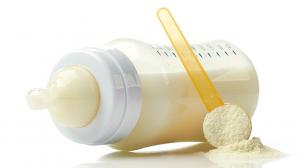USA Infant Formula Market to Reach USD 9.08 Billion by 2035 Amid Demand for Nutrient-Rich Alternatives to Breastfeeding
The U.S. infant formula market is experiencing steady growth driven by rising health awareness and increasing demand for specialized nutritional products.
Growth in the U.S. infant formula market is fueled by the rising awareness of the importance of early-life nutrition, coupled with increasing demand for safe and nutritionally balanced alternatives to breastfeeding. Today’s parents are more informed and selective, opting for infant formula products that mirror breast milk in nutritional value. This demand is further amplified by lifestyle shifts, health conditions, and personal preferences that have prompted many to seek reliable formula options. As a result, manufacturers are innovating with formulas that are organic, non-GMO, and infused with probiotics to meet consumer expectations and regulatory standards.
Gain Early Access to Market Insights – Request a Sample: https://www.futuremarketinsights.com/reports/sample/rep-gb-17839
United States Infant Formula Market Overview
The United States infant formula market is witnessing a notable transformation, driven by shifting parental priorities, advances in pediatric nutrition science, and expanding product innovations. According to a recent market report by Future Market Insights, the U.S. infant formula market is projected to grow significantly, with an increasing focus on organic and functional variants that cater to health-conscious parents.
This growth trend is closely linked to rising awareness regarding infant nutrition, evolving family structures, and a growing demand for fortified and specialized formula options.
Key Drivers: Organic and Functional Formulas on the Rise
One of the most impactful developments in the U.S. infant formula market is the surging demand for organic and clean-label products. Parents are prioritizing formulas that closely mimic breast milk, contain fewer synthetic additives, and offer enhanced nutritional profiles. This has led to a rapid increase in the popularity of organic infant formula market demand in the USA, especially among millennials and Gen Z parents.
The use of functional ingredients in infant formula, such as DHA, ARA, probiotics, and prebiotics, is also becoming a key differentiator. These ingredients are designed to support cognitive development, gut health, and immunity in infants, creating a competitive edge for brands that innovate in this space.
Key Takeaways:
• The U.S. infant formula market is forecasted to grow from USD 6.56 billion in 2025 to USD 9.08 billion by 2035.
• The market is expected to register a 3.3% CAGR between 2025 and 2035.
• Increasing awareness of infant health and nutrition is a major growth driver.
• Demand is growing for organic, non-GMO, and probiotic-enriched formulas.
• Key players are expanding product portfolios to cater to evolving consumer preferences.
Elevate Your Business Decisions – Purchase the Full Report: https://www.futuremarketinsights.com/reports/united-states-infant-formula-market
Competitive Analysis
The U.S. infant formula market is highly competitive, with a mix of global giants and emerging players investing in research, product development, and marketing. Key industry participants include:
• Abbott Laboratories – Market leader with its Similac product line, focusing on both conventional and organic segments.
• Reckitt Benckiser (Mead Johnson Nutrition) – Known for Enfamil, a top-selling brand in the U.S., with a strong emphasis on DHA and brain development.
• Nestlé USA (Gerber) – A significant player offering a range of organic and plant-based infant formulas.
• Bobbie – A rising D2C player appealing to health-conscious millennial parents with its USDA-certified organic infant formulas.
• Nature’s One – Specializing in organic pediatric nutrition, expanding its reach through online platforms.
Strategic collaborations, capacity expansion, and targeted marketing campaigns are key strategies shaping the competitive landscape. Companies are also focusing on transparent labeling and ethical sourcing practices to build brand trust and consumer loyalty.
United States Infant Formula Market by Product Type, Ingredient, Distribution Channel, and Packaging
By Product Type:
By product type, the industry is classified as starting milk formula, follow-on milk formula, and special milk formula.
By Distribution Channel:
By distribution channel, the industry is classified as specialty outlets, supermarkets, online stores, pharmacy stores, and others.
By State:
By state, the industry is segmented as California, Texas, Florida, New York, Illinois, Ohio, North Carolina, Michigan, Colorado, Wisconsin, and Washington.
Explore FMI’s related ongoing Coverage in Food and Beverage Domain:
Infant Formula Market: https://www.futuremarketinsights.com/reports/infant-formula-market
Infant Formula Ingredients Market: https://www.futuremarketinsights.com/reports/infant-formula-ingredients-market
A2 Infant Formula Market: https://www.futuremarketinsights.com/reports/a2-infant-formula-market
Probiotic Infant Formula Market: https://www.futuremarketinsights.com/reports/probiotic-infant-formula-market
About Future Market Insights (FMI)
Future Market Insights, Inc. (ESOMAR certified, recipient of the Stevie Award, and a member of the Greater New York Chamber of Commerce) offers profound insights into the driving factors that are boosting demand in the market. FMI stands as the leading global provider of market intelligence, advisory services, consulting, and events for the Packaging, Food and Beverage, Consumer Technology, Healthcare, Industrial, and Chemicals markets. With a vast team of over 400 analysts worldwide, FMI provides global, regional, and local expertise on diverse domains and industry trends across more than 110 countries.
Contact Us:
Future Market Insights Inc.
Christiana Corporate, 200 Continental Drive,
Suite 401, Newark, Delaware – 19713, USA
T: +1-347-918-3531
Website: https://www.futuremarketinsights.com
Ankush Nikam
Future Market Insights, Inc.
+91 90966 84197
email us here
Visit us on social media:
LinkedIn
Facebook
YouTube
X
Legal Disclaimer:
EIN Presswire provides this news content "as is" without warranty of any kind. We do not accept any responsibility or liability for the accuracy, content, images, videos, licenses, completeness, legality, or reliability of the information contained in this article. If you have any complaints or copyright issues related to this article, kindly contact the author above.
Huntington’s Disease: Charting a New Path with Disease-Modifying Therapies and Strategic Innovation
Paramount Wellness Retreat Addresses the Link Between ADHD and Addiction with Specialized Dual Diagnosis Treatment
Aspire Systems wins Silver Stevie® Award in 2025 American Business Awards®
Kalendarium
Więcej ważnych informacji
 Jedynka Newserii
Jedynka Newserii

 Jedynka Newserii
Jedynka Newserii

Handel

Ze względu na różnice w cenach surowce wtórne przegrywają z pierwotnymi. To powoduje problemy branży recyklingowej
Rozporządzenie PPWR stawia ambitne cele w zakresie wykorzystania recyklatów w poszczególnych rodzajach opakowań. To będzie oznaczało wzrost popytu na materiały wtórne pochodzące z recyklingu. Obecnie problemy branży recyklingu mogą spowodować, że popyt będzie zaspokajany głównie przez import. Dziś do dobrowolnego wykorzystania recyklatów nie zachęcają przede wszystkim ceny – surowiec pierwotny można kupić taniej niż ten z recyklingu.
Przemysł spożywczy
Rośnie presja konkurencyjna na unijne rolnictwo. Bez rekompensat sytuacja rolników może się pogarszać

Rolnictwo i żywność, w tym rybołówstwo, są sektorami strategicznymi dla UE. System rolno-spożywczy, oparty na jednolitym rynku europejskim, wytwarza ponad 900 mld euro wartości dodanej. Jego konkurencyjność stoi jednak przed wieloma wyzwaniami – to przede wszystkim eksport z Ukrainy i niedługo także z krajów Mercosur, a także presja związana z oczekiwaniami konsumentów i Zielonym Ładem. Bez rekompensat rolnikom może być trudno tym wyzwaniom sprostać.
Transport
Infrastruktury ładowania elektryków przybywa w szybkim tempie. Inwestorzy jednak napotykają szereg barier

Liczba punktów ładowania samochodów elektrycznych wynosi dziś ok. 10 tys., a tempo wzrostu wynosi ok. 50 proc. r/r. Dynamika ta przez wiele miesięcy była wyższa niż wyniki samego rynku samochodów elektrycznych, na które w poprzednim roku wpływało zawieszenie rządowych dopłat do zakupu elektryka. Pierwszy kwartał br. zamknął się 22-proc. wzrostem liczby rejestracji w ujęciu rocznym, ale kwiecień przyniósł już wyraźne odbicie – o 100 proc.
Partner serwisu
Szkolenia

Akademia Newserii
Akademia Newserii to projekt, w ramach którego najlepsi polscy dziennikarze biznesowi, giełdowi oraz lifestylowi, a także szkoleniowcy z wieloletnim doświadczeniem dzielą się swoją wiedzą nt. pracy z mediami.









.gif)

 |
| |
| |
|